
Tips to Reuse Old Trash Bins
1) Turn your old trash bin into a backyard composter for lawn and garden waste. Your garden will love it!
2) Already have a composter? Use your old garbage bin to store excess leaves and other organic waste to supplement your compost.
3) Cut your old bins in half and use them for raised flower beds.
4) Use the old bins to make a rain barrel to collect rain-water for use in the garden. It will help lower your water bill and reduce waste.
5) Use your old bins to store firewood. Place it in a convenient location and It'll keep your wood dry throughout the year.
6) Use your old bins for garden supplies. Shovels, rakes, tomato cages, poles and other tall tools will be conveniently located.
7) Move your old bins to the garage or basement for storage of camping and/or sports gear.
8) 7) Use your old bins for pet food storage. Buy your pet food in bulk then store it outside. It will save you money and declutter your home. Be sure to use a secure lid to avoid pests.
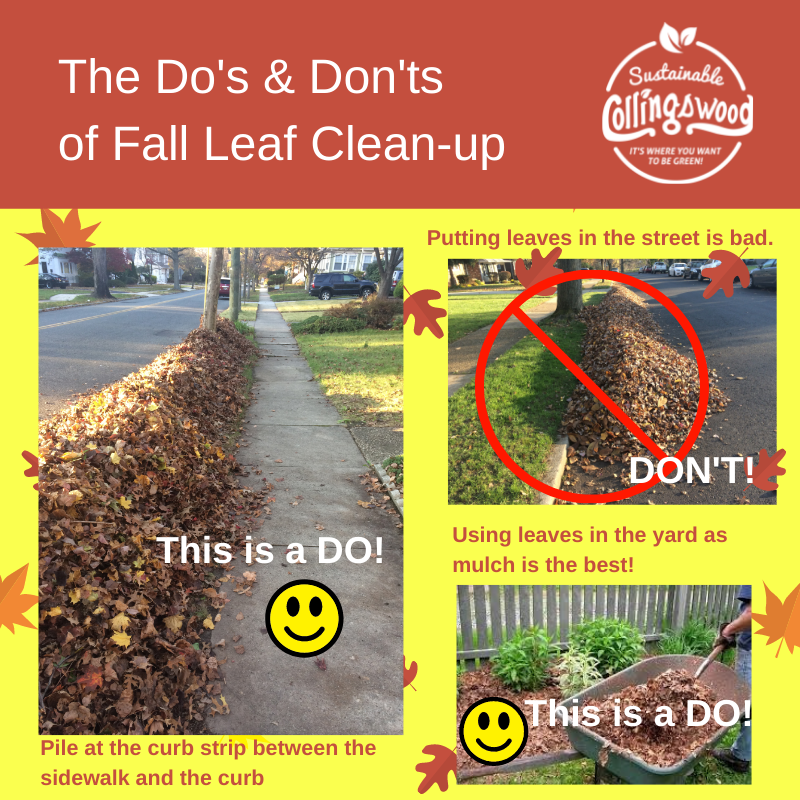
Leave Those Leaves!
In the coming months, autumn will see leaves and yard waste blown into streetside piles for curbside municipal collections. BUT…did you know that municipal leaf collection is intended as a last resort? That’s right: those looking for a perfectly-tailored lawn fertilizer are being offered a free, bottomless supply of nutrient-rich, organic bounty by your friendly neighborhood trees. Left in shredded form (and combined with grass clippings), leaves will naturally decompose into a rich, synthetic chemical-free compost that winter snows will help integrate into your soil. Use a bagging or mulching mower at a minimum deck height of 3”, and redistribute the goodness to your hungry lawn seedlings. Backyard compost enthusiasts can take it a step further and spread some finished compost throughout the lawn, or one could visit local municipal facilities or retailers and obtain a generous supply of finished leaf compost for the same purpose. Many stores offer rentals of rolling compost and mulch spreaders that can assist in evenly distributing the goodness. It’s best to do this following soil raking.
Consider those fallen leaves as less of a burden, and more as nature’s offering of organic gold. Our local waterways will thank you for reducing the nutrient and sediment content from stormwater runoff. Your neighbors will thank you for additional street parking and unhindered roadway passage in the fall and winter months. Your lawn will thank you with a lush, green expanse in the springtime, and your piggybank will have a full belly to use toward more pressing domestic undertakings or some fun! Finally, if you have to dispose of leaves for municipal pick-up, please follow the guidelines below ad make sure they are placed properly for pick-up.
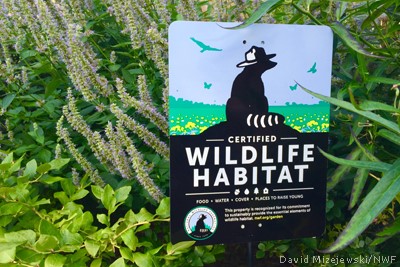
Collingswood's Pledge to Protect Wildlife
At first glance, we may not associate wildlife with the Borough of Collingswood. Yet, a vast and wonderful array of wildlife does live within our borders. Various insects, different plant species, and animals such as foxes, skunks, wild turkeys, and a diverse variety of birds, just to name a few, call Collingswood home. This interconnected ecosystem enriches and protects not only our town but our entire planet. Conserving their natural habitats ensures that future generations of both wildlife and humans can continue to enjoy Mother Nature and a sustainable Earth.
With this goal in mind, the Borough of Collingswood passed three important ordinances to protect its wildlife and their natural habitats. The first is the Pledge to Support Wildlife. This Pledge is our community’s first step in recognizing the important role that wildlife plays in healthy, sustainable communities. The pledge commits the municipality to essential principles that incorporate the interests of New Jersey wildlife into land use management practices and any future development projects.
The Green Grounds ordinance puts the commitment to protect wildlife and their habitats into practice. It ensures that our municipally maintained parks, gardens, and landscaped areas are managed in the most efficient and environmentally friendly manner. This includes landscaping with low-maintenance plantings, maximizing water conservation and minimizing surface runoff, utilizing recycled and composted materials, and taking eco-friendly approaches to integrated pest management.
The Light Pollution ordinance also plays an important role in protecting our natural resources. In addition to minimizing annoying glare caused by misdirected or excessive lighting, nocturnal animals sleep during the day and are active at night. Light pollution radically alters their nighttime environment by turning night into day and interferes with reproduction and reduces their population. This ordinance can reduce these negative impacts and allow the stars to again become part of the community landscape.
Taken together, these three ordinances, combined with other Collingswood sustainability initiatives and policies, will result in improved health of natural habitats, preservation of ecological integrity, and the conservation of limited and valuable resources. Collingswood is committed to protecting the quality of life for all its “residents”—both people and wildlife alike.
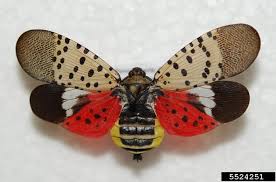
The Spotted Lanternfly - it's pretty but the damage it does is not
The Spotted Lanternfly is (Lycorma delicatula) is an invasive pest with an appetite for plants and crops including ornamentals and vines. It has the potential to do significant damage in our community’s yards and parks but also affects crops including our beloved NJ vineyards that bring us local wines. The pest, first discovered in Pennsylvania uses its piercing-sucking mouthpart to feed on sap from over 70 different plant species including grapevines, maple trees, black walnut, birch, willow, and other trees. The feeding damage stresses plants and trees which can lead to decreased health and even death.
The Spotted Lanternfly was first detected in New Jersey in 2018 and has descended upon our area in droves this summer. Residents and farmers throughout the region are working to maintain their gardens and crops and should remain vigilant in killing the flies when an infestation occurs.
It is important to understand the lifecycle of these flies and how to manage them on one's property. For instance, lanternflies will start laying eggs in the fall, but they are hard to spot and look like mud (see photo below).
Homeowners can manage the flies on their properties by scraping and destroying eggs, placing bands or traps on trees, removing the insect’s favorite hosts such as the Tree of Heaven (Ailanthus altissima), and using registered insecticides for control when appropriate.
Here are a few helpful links with detailed information, videos, and other resources regarding the Spotted Lanternfly:
.png)
Collingswood to host paper shredding and electronic waste recycling event on August 29
laptops, keyboards, ipads, speakers, radio equipment, phones, CDs, VCR tapes, batteries, and more.
Click here for a pdf list of acceptable items
Shredding:
Personal documents you want to securely destroy such as
bank statements, credit card bills, receipts, medical records, tax returns and any other documents that contain personal information.
*NO metal or plastic
*NO junk mail or catalogs

Did You Know? Light Pollution Harms Our Environment
The development of smart outdoor lighting policies can help prevent these negative impacts, save money, and improve nighttime ambiance in communities. As part of the Sustainable Jersey Silver Certification program, the Borough of Collingswood passed a policy ordinance regulating outdoor lighting to reduce light pollution and protect wildlife. Ordinance 1668 calls for efficiently shaped and positioned light fixtures, automatic timers, and maintained illuminance– efforts proven to be effective in preserving the night sky.
In addition to disrupting nocturnal habitats, The International Dark-Sky Association estimates that 30 percent of all outdoor lighting in the U.S. alone is wasted, mostly by lights that aren’t shielded, which adds up to $3.3 billion and the release of 21 million tons of carbon dioxide per year.
Nighttime exposure to artificial light also disrupts the natural circadian rhythm of humans, suppressing melatonin production and increasing risk of obesity, depression, sleep disorders, diabetes, breast cancer, and more, IDA reports.
Many argue that bright, unshielded lights are needed in neighborhoods to help prevent crime and increase safety at night. That is not the case. Bright, unshielded lights provide dangerous glare that decreases visibility. Proper light fixtures, like new lights installed in Collingswood, provide adequate light for increased visibility and decreased light pollution.
Want to learn more? Watch Diane Knutson: Why We Need Darkness or visit https://www.darksky.org.

Summer Sustainability Tips
- Walk or Bike to Get Around Enjoy the summer sun and help the environment by using alternate forms of transportation such as walking or biking instead of driving in a car. In need of a bike? Check out the Collingswood Bike Share. Have feedback on your walking or biking experience in town? Provide input for the Connect 2020 Bike and Pedestrian Master Plan.
- Build a Wildlife Habitat Garden that supports butterflies, birds, and other wildlife. The Collingswood Community Habitat Project works in our community to help residents create habitat gardens certified by the National Wildlife Federation.
- Turn Down the AC Adjust your thermostat by two or three degrees to save energy. On milder days, turn your air conditioner off and open up the windows.
- Stay Hydrated with a Reusable Water Bottle Say no to single-use plastic bottles
- Enjoy Jersey Fresh Soak up all the benefits of delicious summer produce by purchasing locally-sourced food and goods. Not only does local produce taste great, it supports our local economy and reduces our community's carbon footprint. Visit the Collingswood Farmers' Market each week to stock up on fresh, healthy, delicious items brought straight to you by NJ farmers.
- Line Dry Clothes or Sheets Outside to save energy.
- Take the Green Challenge to inspire more sustainable habits you can adopt this summer!
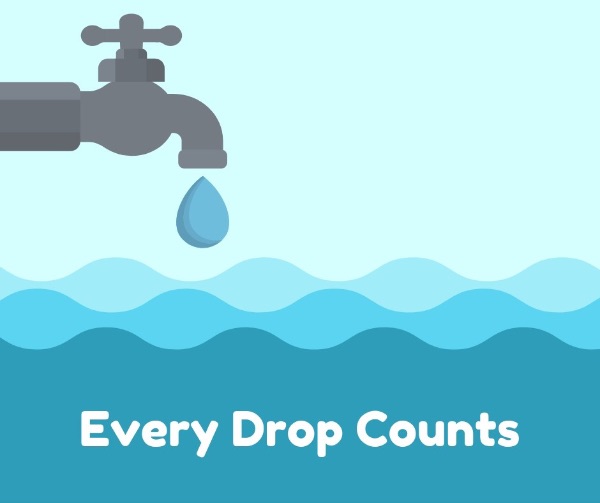
5 Ways to Conserve Water this Summer
- Embrace Summer Rain (and stormwater!) Install a rain barrel or rain garden to capture stormwater runoff. A rain barrel collects rainfall that can be used to water plants, wash your car, and more. A rain garden intercepts, treats, and infiltrates stormwater while creating a habitat for wildlife.
- Sweep Sidewalks and Patios When preparing to enjoy your outdoor areas, opt to cleanup by using a broom to brush any natural dirt or debris back onto your lawn instead of cleaning areas with a hose.
- Place a Cover Over Your Pool If you have a pool at home, place a cover over when it's not in use to help prevent evaporation
- Practice Cut It and Leave It Lawn Care Let grass clippings fall into the soil rather than bagging them and keep grass at a length of 2.5-3.5" high. This method keeps solid shaded from the sun and keeps roots cool, requiring less water to maintain.
- Check Outdoor Fixtures for Leaks The average household's leaks can account for nearly 10,000 gallons of water wasted every year and ten percent of home have leaks that waste 90 gallons or more per day, reports the US Environmental Protection Agency. As outdoor activities commence, be sure your hose and any outdoor fixtures are not leaking any extra water. (Take stock of your indoor fixtures, too!)

Congratulations Collingswood Schools!

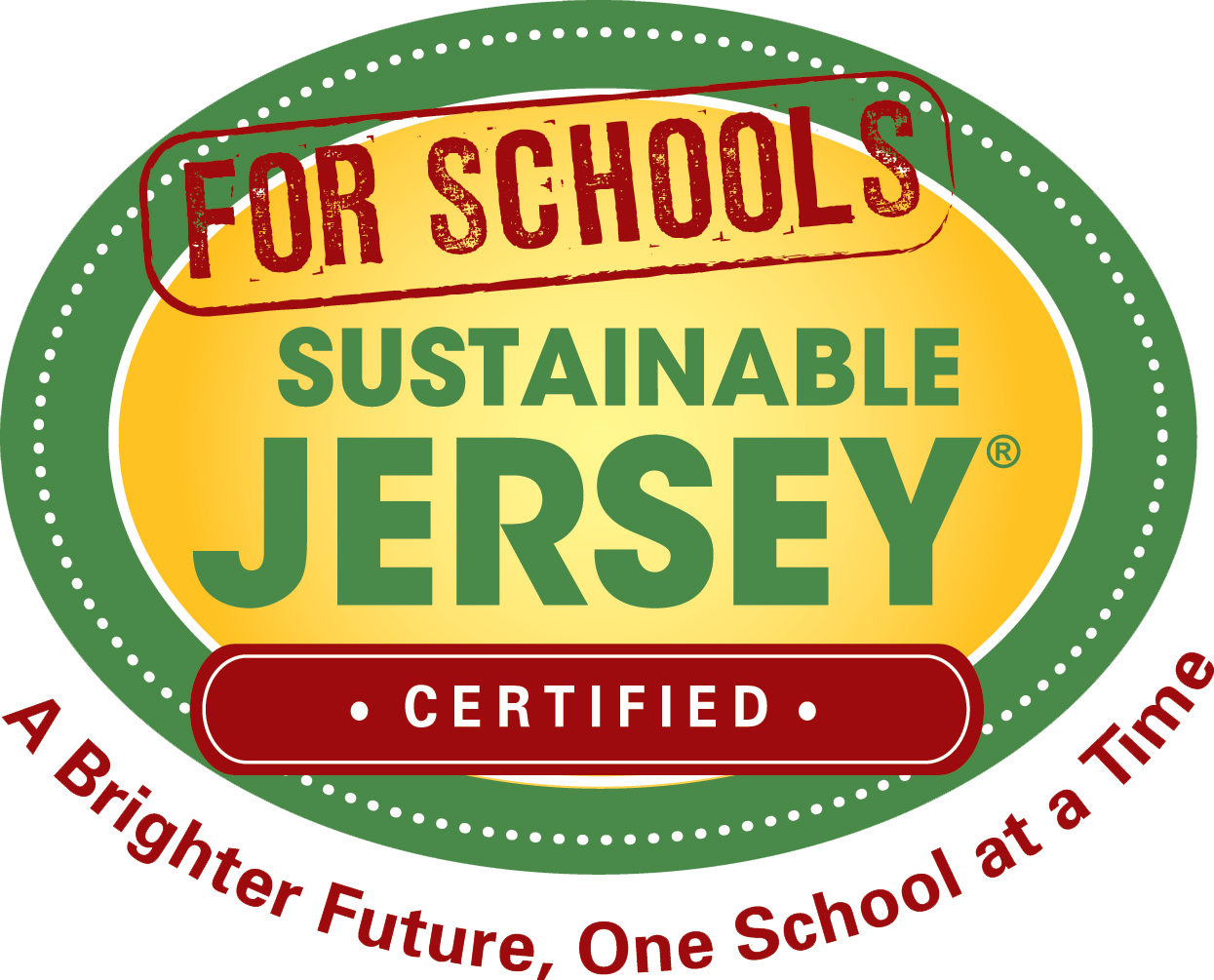

Earth Day 2020– Reflecting on 50 Years
By: Collingswood Commissioner and Green Team Liaison Joan Leonard
If there is one thing we know for sure in our new world of the pandemic, it is that we are all interconnected. We rely on each other and affect each other throughout the world, now more than ever.
We have learned to rise to the occasion, to adapt to change, and to maintain hope for a brighter tomorrow as we focus on the health and safety of each other. Today, Earth Day 2020 is a reflection of what seems like a quick 50 years since the first Earth Day. The 50th anniversary of Earth Day also coincides with the timing of Arbor Day this Friday. The two celebrations go hand in hand in many ways; plant a tree, clean the air! The lofty goals of both Earth Day and Arbor Day have persisted through the decades.
The need to educate ourselves and our community about how we as a nation can heal and protect our planet was so important in 1970 and these goals are even more urgent today. Earth Day was started in the USA by a senator from Wisconsin named Gaylord Nelson and within 20 years the movement spread to 141 countries expanding each passing decade to today where one billion people celebrate in over 190 countries.
As people throughout our world now strive to fight back against COVID-19, we must remain vigilant in gaining health, safety, and protection of our people and also our planet. It is important to reflect on the interdependence of our health and wellness on our natural resources such as water and wildlife. We need each other to live; we need to protect our earth to live. We deserve a clean and healthy environment and to give that life to our children and generations to come.
The time is now for each of us to do everything we can, each in our own way, to be the change we want to see. Let’s all stay safe, stay well, stick together, and also enjoy the beauty and glory of springtime- full of color, rebirth, and hope. We can help each other and help the earth as each of us works to reduce air pollution, reduce waste, and promote sustainable practices in our daily lives.
Together we strive for a healthy planet and a healthy future.
Watch our Arbor Day video here!

Eco-Friendly Events
Upcoming Green Events in Our Area
Click the link on each event for more information!
March
March 4 How to Certify your Backyard with the NWF Audubon Green Team, Oaklyn Green Team Audubon, NJ
March 11 Collingswood Green Team March Meeting Collingswood Community Center
March 12 Sustainable South Jersey Meetup Sustainable South Jersey Glassboro, NJ
March 16 Ocean County Sustainability Hub Sustainable Island Heights, Sustainable Jersey, Long Beach Township, Visit Beach Haven Beach Haven, NJ
March 31 TriCSA Planning Meeting Tri-County Sustainability Alliance Cherry Hill, NJ
April
April 1 Make & Take Propagation 101 Master Gardeners of Camden County Cherry Hill, NJ
April 6-11 Collingswood Wellness Week Collingswood, NJ
April 14 Collingswood Green Team April Meeting Collingswood Community Center
April 25 12th Annual Collingswood Green Festival Collingswood, NJ
May
May 2 Earth Festival & Green Garden Fair Camden County Government, Sustainable Jersey Cherry Hill, NJ
May 3 Clover Market Collingswood Collingswood, NJ

Eco-Friendly Events
Upcoming Green Events in Our Area
Click the link on each event for more information!
February
Feb. 11 Collingswood Green Team February Meeting Collingswood Community Center
Feb. 12 Floral Design Workshop Master Gardeners of Camden County Cherry Hill, NJ
Feb. 12 Therapeutic Horseback Riding Camden County Government Logan Township, NJ
Feb. 15 Winter Invasive Strike Team Saddler's Woods Conservation Association Haddon Township, NJ
Feb. 19 Wild Roots: Planting Planning Workshop Perkins Center for the Arts, Visit South Jersey Collingswood, NJ
Feb. 19 Therapeutic Horseback Riding Camden County Government Logan Township, NJ
Feb. 26 Therapeutic Horseback Riding Camden County Government Logan Township, NJ
March
March 4 How to Certify your Backyard with the NWF Audubon Green Team, Oaklyn Green Team Audubon, NJ
March 11 Collingswood Green Team March Meeting Collingswood Community Center
March 31 TriCSA Planning Meeting Tri-County Sustainability Alliance Cherry Hill, NJ
April
April 25 12th Annual Collingswood Green Festival Collingswood, NJ

Quick Tips For Making Your Holiday Greener
Small Changes Can Have a Big Impact!
Adopt a few new traditions this holiday season to have a positive impact on our community and our world:
- Use a live, potted, native tree and replant it after the holidays.
- Use LED lights for decorating, some are even solar powered.
- Carpool when visiting relatives and friends.
- Bring reusable bags when shopping for holiday gifts.
- For parties, use metal flatware and real glasses and dishes instead of paper products.
- Send E-cards or buy recycled greeting cards.
- Re-use greeting cards or other recycled paper for gift tags.
- Re-use old fabric, newspapers or other materials to make your own unique gift wrap.
Happy Holidays from the Collingswood Green Team!
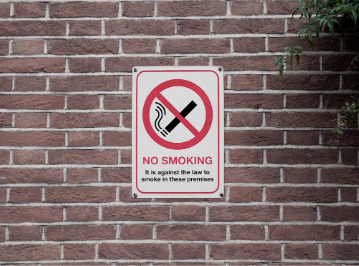
Collingswood Goes Smoke-Free
On Oct. 7, Collingwood Commissioners passed an ordinance banning smoking on publicly-owned property
Defined as “the burning of, inhaling from, exhaling the smoke from, or the possession of a lighted cigar, cigarette, pipe, or any other matter or substance which contains tobacco or any other matter that can be smoked” or “the inhaling or exhaling of smoke or vapor from an electronic smoking device”– smoking is now prohibited on any municipally-owned property including within a 35-foot radius of the front entrance of municipal buildings.
This includes but is not limited to Roberts pool, municipal playgrounds, parking areas, driveways, and drive aisles adjacent to municipal buildings like Borough Hall, The Community Center, and Police Station. Non-smoking areas will be identified with signage in the next month. Violators are subject to a fine up to $1,000.
The Borough of Collingswood and Collingswood Green Team are committed to creating a safe and healthy environment for all. The ordinance recognizes the importance of preventing the youth, residents, and visitors of Collingswood from being exposed to secondhand smoke and enhancing the appearance of public spaces by eliminating the litter created by smoking such as cigarette butts, ashes, and packaging.

Composting 101: Holiday Edition
Compost to make the most of your holiday season!
Each year, we provide deeply discounted compost bins at our Green Festival to help residents compost leftover food and other waste. This holiday season, we want to remind people that food doesn’t have to go to waste! Follow these simple tips and you’ll be composting like a pro in no time:
Save the shells Whether you are cracking eggs for holiday baking or shelling nuts for guests to snack on, extend the life of these generated scraps by tossing them into your compost pile instead of the trash!
Coffee and tea is often enjoyed alongside holiday desserts (or on holiday mornings!). Keep in mind– leftover coffee grounds and tea bags make a great addition to your compost collection.
Fruit and vegetable waste fuel the perfect compost pile. When you are peeling potatoes or trimming green beans, turn away from your trash bin with the scraps and turn toward your composter!
Holiday houseplants may dry out after the season. Add them to your compost bin to bring a carbon-rich component to your mix.
Twice as Nice: Opt to use recycled newspaper to wrap holiday gifts instead of store-bought wrapping paper to cut down on waste produced. Once the gifts are opened, shred the newspaper to use in your compost pile.
Learn more about composting at https://www.sodgod.com/composting/.

Idle-Free is the Way-to-Be!
A resolution adopted on Sept. 3 designates the Borough of Collingswood as an idle-free zone
One-third of greenhouse gas emissions come from the transportation sector. For every gallon of gasoline used, the average car produces about 20 pounds of carbon dioxide (CO2), the largest contributor to greenhouse climate change.
A vehicle is considered idling when the engine is turned on but the vehicle is not in motion. Idling for 10 minutes uses as much fuel as it takes to travel 5 miles. Vehicle idling also poses serious health risks. By contaminating the air with harmful particles and chemicals, vehicle exhaust can trigger asthma attacks and increase risk of heart and lung ailments.
Vehicle idling commonly occurs in areas such as parking lots, drive-through windows, business centers, and around school buildings. Idling also increases during the winter months when drivers opt to “warm up the engine.” Contrary to popular belief, modern cars do not require a warm-up period, and turning a car on and off does not harm the engine, according to Sustainable Jersey.
Next time you are taking a drive, remember to turn the engine off when the car is not in motion. Share this information with family and friends! Together, we can make a difference.

Eco-Friendly Events
Upcoming Green Events in Our Area
Click the link on each event for more information!
November
Nov. 13 Collingswood Green Team November Meeting Collingswood Community Center
Nov. 13 Webinar: How ESIPs Fund Energy Upgrades Sustainable Jersey Ewing, NJ
Nov. 16 Work Party Collingswood Community Garden Washington Ave Garden
Nov. 16 Knight Park Clean Up Collingswood, NJ
Nov. 16 Annual Canoe Brook Reservoir Count New Jersey Audubon Urban Education Bernardsville, NJ
Nov. 20 TriCSA November Meeting Tri-County Sustainability Alliance Cherry Hill, NJ
Nov. 21 Sustainable Practices Working Session Sustainable Jersey, New Jersey School Boards Association, ELFNJ Allamuchy, NJ
Nov. 21 Camden Environmental Summit A New View - Camden Camden, NJ
December
Dec. 4 Garden Meeting Collingswood Community Garden Collingswood Library
Dec. 7 December History Hike at Petty’s Island New Jersey Audubon’s Scherman Hoffman Wildlife Santuary Pennsauken, NJ
Dec. 10 Collingswood Green Team December Meeting Collingswood Community Center
January
Jan. 22 TriCSA Energy Efficiency Summit Sustainable Jersey, Tri-County Sustainability Alliance Haddonfield, NJ
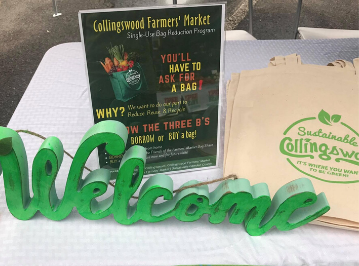
Support the Single-use Bag Reduction Ordinance
Collingswood's Commissioners introduce a package of ordinances and resolutions related to green initiatives on Sept. 3
We are happy to announce that Collingswood's Commissioners will introduce a package of ordinances and resolutions that the Green Team has been working on for the past year at their upcoming meeting on September 3. The Ordinances and Resolutions, most of which are recommended models developed by Sustainable Jersey, establish a variety of measures or programs including encouraging sustainable development and land-use, protecting wildlife, conserving water, and establishing a green grounds and maintenance policy.
The drafts on Collingswood’s agenda for Tuesday night are: Sustainable Land-Use Pledge, Complete Streets Resolution, Support for New Jersey’s Wildlife Action Plan, Green Grounds Maintenance, Prohibiting Smoking on Public Property Ordinance, Outdoor Light Pollution Ordinance, Water Conservation Ordinance, Resolution Establishing a Creative Team, Resolution Supporting Anti-Idling Zones and NJ State Statute (update from 2006), Ordinance Creating a Green Development Checklist, and a Single-use Plastic Bag Ban Ordinance.
We are particularly excited by the Single-use Bag Reduction Ordinance. Currently, 35 of New Jersey’s 565 municipalities and one of 21 counties have passed some sort of plastic bag ban or regulation. Of those, 23 are in effect with 12 slated to go into effect within the next 6 months. If adopted, Collingswood will be the first town in the tri-county region comprised of Burlington, Camden and Gloucester Counties, to pass a bag reduction ordinance.
Last summer, the Collingswood Green Team, Friends of the Farmers’ Market, and the Borough joined forces to implement a bag reduction education program after several green team members noted a significant use of plastic at the market.
The program consisted of a new rule that “you’ll have to ask for a bag” to begin educating businesses and consumers to be more conscious of alternatives available. The Collingswood Green Team and Friends of the Farmers’ Market were on hand to make it easier for shoppers by providing alternatives to plastic bags. We provided three choices for shoppers with our Bring, Borrow, or Buy Program where shoppers could bring their own reusable bag, borrow a bag, or buy an inexpensive bag to use instead of plastic. During the market last year, we provided approximately 500 reusable bags with another 500 distributed at other town-wide events.
Not all plastic bag rules are created equal. The ordinance on deck for Tuesday's first reading aims to decrease not only the use of plastic bags but ALL single-use bags. The hybrid ban/fee ordinance includes a fee for paper and a plastic ban within 6 months of adoption. The ordinance as written will be in effect after a 6-month voluntary phase geared at getting the word out to consumers and allowing businesses adequate time to plan for the ban. It’s important to understand that just switching to paper is not the best answer. While the elimination of plastic certainly has a positive impact on the harmful effects on precious marine life, the manufacturing and harvesting of paper bags also affect the environment. The Collingswood ordinance is designed to encourage people to go without a bag or utilize reusable bags.
You can view and download the Bag Reduction Ordinance along with other sustainable community ordinances on the Commission's September meeting agenda at the Borough’s Meeting and Forums page here.
About Sustainable Jersey and the Collingswood Green Team:
Sustainable Jersey, created in 2009, is a nonprofit organization that provides tools, training, and financial incentives to support communities as they pursue sustainability programs. Towns pledge to a series of measures on the municipal level including reducing waste, improving environmental equity and implementing sustainable policies. Sustainable Jersey also provides grant opportunities for sustainable programs throughout New Jersey.
Collingswood was first certified as a “Bronze” Level Community in 2013 in recognition of its’ environmental efforts. Our goal is to reach Silver Certification in 2020. Due to the work of sustainable Jersey over the past 10 years, many organizations in New Jersey give extra weight to grant applications submitted by towns with the certification or whose programs are aligned with Sustainable Jerseys programs.
The Collingswood Green Team is a group of resident volunteers, borough employees, and businesses that work with the Borough Commission to implement programs that improve our environment. If you are interested in joining the Green Team, please email jleonard@collingswood.com or direct message us on Facebook @CollsGreenTeam.
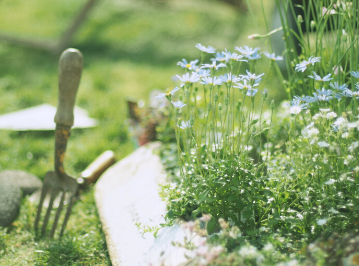
Build a Rain Garden at Home
It's Simple to Install!
Did You Know? Our community could treat and recharge one million gallons of water each year if we built 40 rain gardens!
Rain gardens are an easy way to protect our community’s water resources and promote native habitats and landscapes. Rain gardens intercept, treat, and infiltrate stormwater at its source and are simple to install at home. Built as a shallow landscaped depression, rain gardens can be a butterfly habitat, wet meadow, perennial garden, trees and shrubs, along a sidewalk, or even a parking island!
The key to a successful rain garden is planning, and the key to successful planning is research! What materials do I need? Where is the best place to build? How large or small should I make my garden? The answer to all these questions (and more!) can be found in The Native Plant Society of New Jersey’s free rain garden manual. The manual outlines a step-by-step way to plan, install, and maintain a rain garden at home. View the guide here: https://npsnj.org/pages/nativeplants_Rain_Gardens.html?fbclid=IwAR1xntaVpyyX9ahUEaoH48a5lUney7e8hucWGNr4Z461cUW74px4WfXScVA
Here are a few simple tips:
- A rain garden should be about twice as long as it is wide.
- Rain gardens should be planted at least 10 feet away from buildings with a basement. If there is not a basement, the garden can be placed two feet away.
- Be sure to locate utility lines before you start to dig!
- Do not build rain gardens near trees. Soil near trees has the best drainage and should not be disturbed.
Have you created a rain garden in our community? Snap some photos and share them with us on Facebook @collsgreenteam.
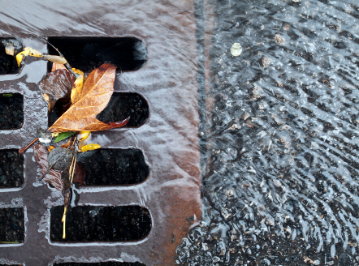
Only Rain in the Drain!
Did You Know? Not all water that falls soaks into the ground. As water flows off your property, it can wash pollutants such as soil, lawn chemicals, and pet waste into storm drains which end up in local bodies of water such as the Cooper River, Newton Lake and the Delaware River. Here are some simple tips for preventing polluted runoff:
- Direct gutter downspouts to a rain barrel or vegetation such as rain gardens.
- Wash your automobile at a car wash that recycles and treats water.
- Pick up after your pet and dispose of it in the trash or flush it down the toilet.
- Reduce or eliminate your use of fertilizers and pesticides.
- Don’t empty buckets with cleaning products outside or down a storm drain. Better yet, use environmentally nonhazardous, biodegradable and phosphorous-free cleaning products.
- Never throw trash in a sewer! Not only can it end up in our waterways, but it can clog up the sewer and cause overflow and even more pollution.
- Sweep up dirt and debris and place on your lawn, in the garden or in the trash. Hosing off sidewalks and driveways washes pollutants into storm drains and ultimately our waterways.
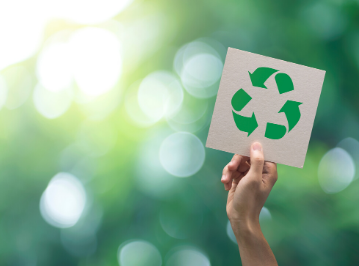
Crack the Recycling Code
Tips for Recycling Right
Recent updates to our county’s recycling system may have left you wondering what can and can’t go into your blue bin. Feat not- we’re providing all the tools you need to understand these changes. Updated recycling flyers from Camden County can be found here for residents to reference any time you are unsure where to put your glass jars or junk mail. Looking for a more tech-savvy approach? Download the FREE Recycle Coach app. Find answers at your fingertips, anywhere, to questions about collection schedules, recycling events or how to dispose of an item. The app even has a quiz to discover what type of recycler you are! Find the app on the Recycling Information page. Keep in mind when it comes to plastics, the BEST approach for our environment is to REDUCE your use of single-use plastics. In order to keep recycling costs down and maximize the success of the recycling process, we ask all residents follow these guidelines:
Acceptable items include glass bottles and jars, paper towel rolls, aluminum and metal cans, loose metal jar lids, steel bottle caps, file folders, office paper, greeting cards, regular and junk mail, cartons, paperboard boxes such as cereal, pasta and tissue boxes, flattened corrugated cardboard, paper bags, paper books, phone books, newspapers, magazines, brochures and inserts (untied and unbundled, no bags) and #1 and #2 plastic food and beverage containers ONLY. All containers must be emptied, rinsed and dried and all cardboard boxes flattened. There is no need to remove paper clips, stamps, address labels, metal fasteners, cellophane address windows, rubber bands, serial bindings or plastic tabs.
Items that can NOT be recycled are plastic bags, plastic microwave trays, frozen food or juice containers, ice cream containers, stickers or address label sheet waste, styrofoam or paper to-go containers, organic matter, food waste or any plastic other than #1 and #2.
Prescription drugs can be disposed in the Project Medicine Drop Box in the lobby of the Collingswood Police Department (735 N. Atlantic Ave). This drop box is available to residents 24 hours a day, 7 days a week.
Special waste collections such as electronic recycling, hazardous waste collection and shredding events are held by Camden County’s Division of Environmental Affairs throughout the year. These events are free and for residents only. Find more information on camdencounty.com.
Paper shredding, hazardous waste collection, electronic recycling and a latex paint collection are happening in Collingswood on April 13 at the Collingswood Green Festival. Find details here.
Did you know? Plastics are identified with a number ranging one to seven, called the Resin Identification Code (RIC). The RIC can be found inside a recycling symbol usually on bottom, top or side of the container.
